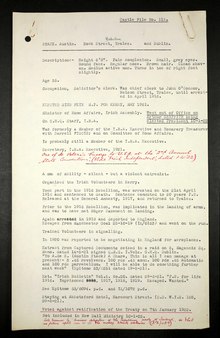Austin Stack
Austin Stack | |||||||||||||||||||||||||||||||||||||||||
|---|---|---|---|---|---|---|---|---|---|---|---|---|---|---|---|---|---|---|---|---|---|---|---|---|---|---|---|---|---|---|---|---|---|---|---|---|---|---|---|---|---|
 | |||||||||||||||||||||||||||||||||||||||||
| Minister for Home Affairs | |||||||||||||||||||||||||||||||||||||||||
| In office 22 August 1921 – 9 January 1922 | |||||||||||||||||||||||||||||||||||||||||
| President | Éamon de Valera | ||||||||||||||||||||||||||||||||||||||||
| Preceded by | Arthur Griffith | ||||||||||||||||||||||||||||||||||||||||
| Succeeded by | Eamonn Duggan | ||||||||||||||||||||||||||||||||||||||||
| Teachta Dála | |||||||||||||||||||||||||||||||||||||||||
| In office August 1923 – June 1927 | |||||||||||||||||||||||||||||||||||||||||
| Constituency | Kerry | ||||||||||||||||||||||||||||||||||||||||
| In office May 1921 – August 1923 | |||||||||||||||||||||||||||||||||||||||||
| Constituency | Kerry–Limerick West | ||||||||||||||||||||||||||||||||||||||||
| In office December 1918 – May 1921 | |||||||||||||||||||||||||||||||||||||||||
| Constituency | Kerry West | ||||||||||||||||||||||||||||||||||||||||
| Personal details | |||||||||||||||||||||||||||||||||||||||||
| Born | Augustine Mary Moore Stack 7 December 1879 Tralee, County Kerry, Ireland | ||||||||||||||||||||||||||||||||||||||||
| Died | 27 April 1929 (aged 49) Dublin, Ireland | ||||||||||||||||||||||||||||||||||||||||
| Political party | Sinn Féin | ||||||||||||||||||||||||||||||||||||||||
| Spouse(s) | Winifred Cassidy (m. 1925) | ||||||||||||||||||||||||||||||||||||||||
| Military service | |||||||||||||||||||||||||||||||||||||||||
| Allegiance | |||||||||||||||||||||||||||||||||||||||||
| Years of service | 1916–1922 | ||||||||||||||||||||||||||||||||||||||||
| Battles/wars | |||||||||||||||||||||||||||||||||||||||||
| |||||||||||||||||||||||||||||||||||||||||

Augustine Mary Moore Stack (7 December 1879 – 27 April 1929) was an Irish republican and politician who served as Minister for Home Affairs from 1921 to 1922. He was a Teachta Dála (TD) from 1918 to 1927.[1]
Early life
[edit]Stack was born in Ballymullen, Tralee, County Kerry, to William Stack, an attorney's clerk, and Nanette O'Neill.[2][3] He was educated at the Christian Brothers School in Tralee.[4] At fourteen, he left school and became a clerk in a solicitor's office. A gifted Gaelic footballer, he captained the Kerry team to All-Ireland victory in 1904. He also served as President of the Kerry Gaelic Athletic Association County Board.
Activism
[edit]He became politically active in 1908 when he joined the Irish Republican Brotherhood. In 1916, as commandant of the Kerry Brigade of the Irish Volunteers, he made preparations for the landing of arms by Roger Casement. He was made aware that Casement was arrested on Easter Saturday and was being held in Tralee. He did not attempt to rescue him from Ballymullen Barracks.
Stack was arrested and sentenced to death for his involvement in the Rising; however, this was later commuted to penal servitude for life. Imprisoned at HM Prison Dartmoor Stack was in the company of senior leaders of the rebellion: Éamon de Valera, Harry Boland and Thomas Ashe. Stack was a leader of Irish Republican prisoners and led several hunger strikes as resistance to being treated as criminals[5] He was released under general amnesty in June 1917 and was elected as an abstentionist Sinn Féin MP for Kerry West at the 1918 Westminster election, becoming a member of the 1st Dáil. He was elected unopposed as an abstentionist member of the House of Commons of Southern Ireland and a member of the 2nd Dáil as a Sinn Féin TD for Kerry–Limerick West at the 1921 elections.[6]
Stack, as part of his role as Minister for Home Affairs, was responsible for the creation and administration of the Dáil Courts.[7] These were courts run by IRA in parallel and opposition to the judicial system being run by the British government. The IRA and Sinn Féin were highly successful in both getting the civilian population of Ireland to use the courts and accept their rulings. The success of this initiative gave Sinn Féin a large boost in legitimacy and supported their goals in creating a "counter-state" within Ireland as part of their overarching goals in the War of Independence.[8][9] Frank O'Connor, later a republican colleague in the civil war, considered him a failure as home affairs minister for an unrealistic attitude to overseeing a ministry in constrained circumstances – a complaint many of his cabinet colleagues made.[10]
He opposed the Anglo-Irish Treaty of 1921 and took part in the subsequent Civil War, acting as deputy chief of staff for the anti-treaty leader Frank Aiken.[11] He was captured on 14 April 1923 and went on a hunger strike for forty-one days before being released along with approximately 15,000 Sinn Fein and IRA prisoners in July 1924.[12] (see: 1923 Irish hunger strikes).
Dáil
[edit]He was elected to the Third Dáil at the 1922 general election and subsequent elections as an Anti-Treaty Sinn Féin TD for the Kerry constituency. When Éamon de Valera founded Fianna Fáil in 1926, Stack remained with Sinn Féin being re-elected to the Dáil at the June 1927 general election. He did not contest the September 1927 general election.
Personal life
[edit]In 1925, he married Winifred (Una) Gordon, née Cassidy (died 1950),[13] the widow of a Royal Irish Constabulary district inspector, Patrick Gordon (1870–1912).[14]
Stack's health never recovered after his hunger strike and he died in a Dublin hospital on 27 April 1929, aged 49.
Honours
[edit]At his death, a pamphlet was issued to commemorate his dedication to the cause of Irish freedom: "...Austin Stack, a man who bore and dared and suffered, remaining through it all and at the worst, the captain of his soul...The force of England, of the English Slave State, might try coercion, as they did many times. It made no difference. He went his way, suffered their will, and stood his ground doggedly, smiling now and again. His determination outstood theirs because it had a deeper foundation and a higher aim. Compromise, submission, the slave marks, did not and could not exist for him as touching himself, or the Cause for which he worked and fought, lived and died."[15]
Austin Stack Park in his home town of Tralee, one of the Gaelic Athletic Association's stadiums, is named in his honour, as is the Austin Stacks GAA Hurling and Gaelic football club.
References
[edit]- ^ "Austin Stack". Oireachtas Members Database. Archived from the original on 8 November 2018. Retrieved 6 January 2010.
- ^ "Baptismal record". IrishGenealogy.ie. Retrieved 27 April 2017.
- ^ "General Registrar's Office". IrishGenealogy.ie. Archived from the original on 22 September 2021. Retrieved 27 April 2017.
- ^ Gaughan, J. Anthony. "Stack, Austin". Dictionary of Irish Biography. Retrieved 8 January 2022.
- ^ Macardle, Dorothy (1965). The Irish Republic. New York: Farrar, Straus and Giroux. pp. 202, 229.
- ^ "Austin Stack". ElectionsIreland.org. Archived from the original on 22 February 2011. Retrieved 6 January 2010.
- ^ Macardle, p. 503
- ^ "Archived copy" (PDF). Archived from the original (PDF) on 24 April 2018. Retrieved 5 January 2019.
{{cite web}}: CS1 maint: archived copy as title (link) - ^ "Revolutionary Justice - the Dáil Eireann Courts". 24 January 2013. Archived from the original on 6 January 2019. Retrieved 5 January 2019.
- ^ Frank O'Connor (1966), The Big Fellow (Dublin, Clonmore & Reynolds), pp. 89–90
- ^ Macardle, pp. 578, 748.
- ^ Coogan, Tim (2002). The IRA. New York: St. Martins Press. p. 39. ISBN 0-312-29416-6.
- ^ "General Registrar's Office". IrishGenealogy.ie. Archived from the original on 22 September 2021. Retrieved 27 April 2017.
- ^ "Helen's Family Trees - GORDON - gor07.htm". www.helensfamilytrees.com. Archived from the original on 27 April 2017. Retrieved 27 April 2017.
- ^ Coogan, p. 219-220
External links
[edit]- . . Dublin: Alexander Thom and Son Ltd. 1923. p. – via Wikisource.
- 1879 births
- 1929 deaths
- All-Ireland–winning captains (football)
- Early Sinn Féin TDs
- Irish Republican Army (1919–1922) members
- Irish Republican Army (1922–1969) members
- Kerry inter-county Gaelic footballers
- Members of the 1st Dáil
- Members of the 2nd Dáil
- Members of the 3rd Dáil
- Members of the 4th Dáil
- Members of the 5th Dáil
- Members of the Irish Republican Brotherhood
- Members of the Parliament of the United Kingdom for County Kerry constituencies (1801–1922)
- Ministers for justice of Ireland
- People from Tralee
- People of the Irish Civil War (Anti-Treaty side)
- Politicians from County Kerry
- UK MPs 1918–1922
- Politicians imprisoned during the Irish revolutionary period
- Sportspeople from Tralee

